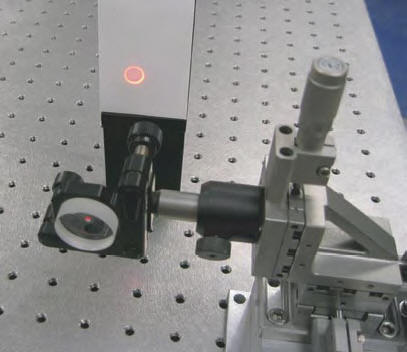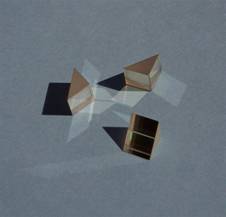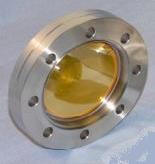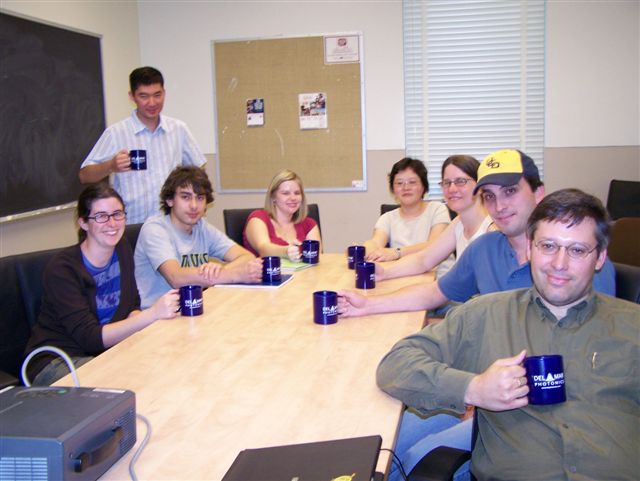Del Mar Photonics - Laboratory Astrophysics and
Astrochemistry
European Conference on Laboratory Astrophysics (ECLA), 26 -
30 September, 2011, Paris, France
Laboratory astrophysics is a vast interdisciplinary field whose aim is to
complement and support astrophysical observations with laboratory-based
measurements, simulations, theoretical modeling and numerical approaches. It is
naturally related to all modern observational techniques, ground based
telescopes and space missions, including in-situ analysis of extraterrestrial
objects by interplanetary probes. It makes also use of many large instruments of
physics such as synchrotron radiation, high-energy lasers and sophisticated
analytical tools such as mass spectrometry. It
therefore fosters the collaboration between astronomers, astrophysicists,
geochemists, physicists of various disciplines as well as chemists.
The objective of this conference is to gather scientists involved in this field
to discuss recent challenges and advances in the understanding of the
astrophysical matter and processes in very different environments and to share
their expertise in the field of laboratory astrophysics.
The subjects covered are planetary science, including exoplanets, stellar
environments and the interstellar medium, stellar physics, including solar
physics and plasmas, compact objects and high-energy processes.
For more details, see the Conference Website: http://ecla.obspm.fr
Postdoctoral Positions relevant to Del Mar Photonics
business development
e-mails us
From time to time Del Mar Photonics posts announcements for PhD research
scholarships and postdoctoral positions in different locations worldwide. Most
of those positions are relevant to Del Mar Photonics product portfolio, so we
belive that our current and potential customers can be intersted in those
opportunities. To find more opportunities go to the main page and search for
Postdoc on that page. Some positions can be already filled out - we do not track
if the positions are current.
PhD position available at FELIX
Date: Thu, 24 Mar 2011 16:30:03 +0000
At the FELIX free electron laser facility, a PhD position is available for work
in the field of Laboratory Astrochemistry
in particular, to study the structure and spectroscopy of gas-phase
photo-products of polyaromatic molecules using the Free Electron Laser ‘FELIX’.
Job description: FELIX is the Free Electron Laser facility at FOM Rijnhuizen
providing intense tunable infrared radiation to users from around the world. The
in-house user group of Prof. Jos Oomens has developed a successful program
applying the FELIX radiation to IR action spectroscopy on dilute gas-phase
samples, including mass-selected molecular ions. For these experiments, the IR
beamline is coupled to different ion trapping mass spectrometers.
Polyaromatic hydrocarbon molecules (PAHs) are now generally accepted to occur
abundantly in interstellar environments, evidenced by IR emission bands observed
from a great variety of astronomical objects. UV excitation is an essential step
in the proposed IR emission process. It is also known that PAHs undergo
photo-dissociation under UV irradiation and it is thus likely that such
photo-products also occur in space. However, to date little is known about the
photo-chemistry of PAHs and the spectral properties of the products formed. In
this project we will investigate the PAH photoproduct structures by IR
spectroscopy using the FELIX. This project forms an integral part of the
recently started Dutch Astrochemistry Network funded by NWO, see
www.nwo.nl/astrochemistry
Requirements
• Master’s degree in physical chemistry, experimental physics or astrochemistry
• Laboratory skills
• Interest in astrophysical questions
• Some experience in mass spectrometry and/or gas-phase (laser) spectroscopy is
desired.
• Experience with (quantum-chemical) molecular modeling is an advantage
Information: for further information see www.rijnhuizen.nl or contact Prof. J.
Oomens (+31 30 6096999 / joso@rijnhuizen.nl).
Employment conditions: FOM offers a stimulating work environment in an area of
applied, forefront research. When fulfilling a PhD position at FOM, you will get
the status of junior scientist. You will have an employment contract for the
duration of 4 years and can participate in all the employee benefits FOM offers.
The gross monthly salary starts with ˆ 2037,- in the first year and increases to
ˆ 2610,- in the fourth year of your employment. The salary is supplemented with
a holiday allowance of 8% and an end-of year bonus of 8.33%. A high-quality
training programme is part of the agreement. You and your supervisor will make
up a plan for the additional education and supervising that you specifically
need. The research has to result in a thesis at the end of the four year term
with FOM. The position is available immediately. Employment conditions are laid
down in the ‘CAO onderzoek¬instellingen’ and can be consulted at the FOM website
www.fom.nl under ‘FOM personeel (NED) or FOM personnel (ENG)’.
Application: Your letter of application with resume can be sent to Karijn
Heling, FOM Institute for Plasma Physics, P.O. Box 1207, 3430 BE Nieuwegein, The
Netherlands or by e-mail: vacancies@rijnhuizen.nl. Please note ‘vac. no 10/007
in your application letter.
Del Mar Photonics featured optical
components
Del Mar Photonics continuously expands its optical components
portfolio. Browse our online store,
read monthly notes about our featured optical products or just
send
us your requirements or product ideas.

|
Axicon Lens
Axicon lens also known as conical lens or rotationally symmetric prism is
widely used in different scientific research and application. Axicon can be
used to convert a parallel laser beam into a ring, to create a non
diffractive Bessel beam or to focus a parallel beam into long focus depth.
Del Mar Photonics supplies axicons with cone angles range from 130° to
179.5° for use with virtually any laser radiation. We manufacture and supply
axicons made from BK7 glass, fused silica and other materials.
buy online -
download brochure |
 |
Rutile (TiO2) coupling
prisms
Del Mar Photonics offers optical elements made of high quality synthetically
grown Rutile Titanium Dioxide crystals. Rutile’s strong birefringency, wide
transmission range and good mechanical properties make it suitable for
fabrication of polarizing cubes, prisms and optical isolators. Boules having
high optical transmission and homogeneity are grown by proprietary method.
Typical boules have 10 - 15 mm in dia. and up to 25 mm length. Optical
elements sizes - from 2 x 2 x 1 mm to 12.7 x 12.7 x 12.7 mm. Laser grade
polish quality is available for finished elements. So far we the largest
elements that we manufactured are 12 x15 x 5 mm, in which optical axis is
parallel to 15 mm edge, 5 mm is along beam path, 12 x 15 mm faces polished
20/10 S/D, one wave flatness, parallelism < 3 arc.min. (better specs.
available on request).
more details -
buy online -
download brochure |
 |
Vacuum viewport
Del Mar Photonics offer a range of competitively priced UHV viewports ,
Conflat, ISO or KF including a variety of coatings to enhance performance.
Del Mar Photonics viewports are manufactured using advanced techniques for
control of special and critical processes, including 100 percent helium leak
testing and x-ray measurements for metallization control. Windows Materials
include: Fused silica, Quartz , Sapphire , MgF2, BaF2, CaF2, ZnSe, ZnS, Ge,
Si, Pyrex. Standard Viewing diameters from .55" to 1.94 ".
Coating - a range of custom coatings can applied - which include
- Single QWOT
- Broad Band AR
- V coatings
- ITO
- DLC (Diamond like coating)
more
details -
request a
quote |
 |
Manufacturing challenging optical components
Our group works to characterize the interaction of biomolecules with solid
surfaces, writes Dennis Hore of
University of Victoria, Canada. Nature designs proteins with well-defined
structures in solution. The conformation of these molecules may serve a
structural purpose, or a chemical one in the case of enzymes. In order to
further the progress of technologies that immobilize such molecules on
synthetic surfaces (like biosensors employing enzymes), it is important to
have a detailed understanding and control of the interactions of these
molecules with the surface more
For that project Del Mar has been able to manufacture all shapes of prisms
from CaF2, fused silica, and ZnSe according to our custom specifications.
Del Mar Photonics online store
features windows, prisms, lenses, attenuators, etalons, crystals and wafers,
and other items.
Axicons,
barium fluoride windows,
germanium etalons,
rutile (TiO2) prisms,
microchannel plates and
detectors,
saturable absorber mirrors,
photoconductive THz antennas,
lithium niobate wafers and crystals and many other high quality
affordable components for scientific research and OEM production are
delivered globally from stock.
|
 |
We are looking forward to hear from you and help you with
your optical and crystal components requirements. Need time to think about
it?
Drop us a line and we'll send you beautiful Del Mar Photonics mug (or
two) so you can have a tea party with your colleagues and discuss your
potential needs
|



